Create Simulation Scenario
You can create the simulation scenarios.
Select a system either in Live System Editor or PPR Context and click
Production System Simulation
 . . The following dialog box appears.
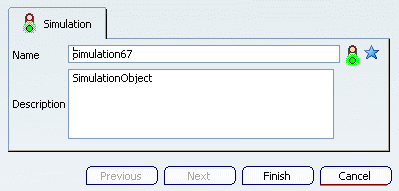
Fill the Name and Description fields and click Finish. A simulation object with a scenario gets created and
opens up in the SIMULIA window.
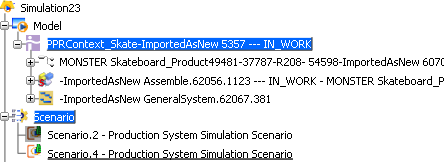
Note:
For the first time, scenario creation launches the SIMULIA window. After you switch back to the Live System Editor, you can edit scenarios with the Edit Scenario Parameters  . .
To select a Scenario:
- Click OK in the Simulate and Generate Result dialog box.

Generally, a PLM update operation is launched first, then both the
Computation Status
dialog box and the
Simulation progress bar appears.
The Computation Status
dialog box displays the status and time of each simulation run.
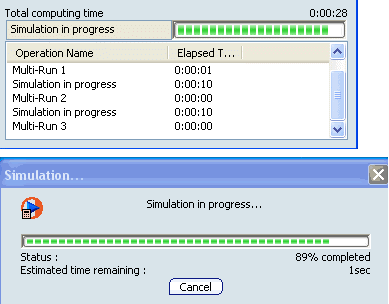
The result of scenario appears under the Result node.
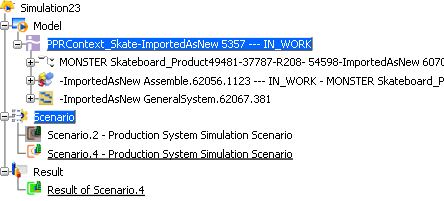
Note:
If an error is detected during the computation, the
Incident Diagnosis
dialog box appears to let you understand, analyze, and solve the
problem.
Switch to Live System Editor.

Edit Simulation Scenario
You can edit the simulation scenarios.
- To edit the scenario parameters:
- Modify the parameters and click OK or
 . .
- Simulation Time: Time after which simulation automatically stops.
- Warmup Time: Time at which statistics collection starts.
- No. of Runs: Number of times for which simulation runs.
Note:
For multi run simulation, specify number of runs greater than 1.
Note:
It is recommended to edit scenario parameters this way as it avoids unnecessary switch (back and forth) between SIMULIA window and Live System Editor.
- Click Preview to launch the simulation toolbar to
execute and control the system simulation.
See Simulation Player Toolbar

Visualize the Flow Animations in Live System Editor
You can visualize the flow animations in the Live System Editor. The Objective Factor is provided in the Define Scenario Input Parameters dialog box of all systems. You can specify the operating cost in Operating Cost field. The operating cost can be
negative or positive. If the operation cost field is zero, the
objective factor of the system is taken into account for
tracking the objective.
Switch to Live System Editor. The following window comes in view.

the active scenario is selected. Click  to get Edit Simulation Object sub-toolbar. to get Edit Simulation Object sub-toolbar.

Click  to add a scenario in the Scenario drop-down list. to add a scenario in the Scenario drop-down list.

Click  to remove a scenario in the Scenario drop-down list. to remove a scenario in the Scenario drop-down list.

Click  to get Edit Scenario sub-toolbar. to get Edit Scenario sub-toolbar.

Click Edit Scenario Parameters  to edit scenario parameters. to edit scenario parameters. See Defining and Visualizing Simulation Scenarios Click Edit Scenario Inputs and select a system to edit scenario inputs. and select a system to edit scenario inputs. Modify the scenario inputs in Define Scenario Input Parameters dialog box.
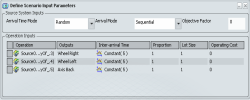
Click Preview Scenario  launch the simulation toolbar to
execute and control the system simulation. launch the simulation toolbar to
execute and control the system simulation. Click Generate and View Results of Scenario  to view the saved/generated simulation results. to view the saved/generated simulation results.
|
![]()
 in the Live System Editor to edit the scenario parameters.
in the Live System Editor to edit the scenario parameters.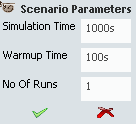
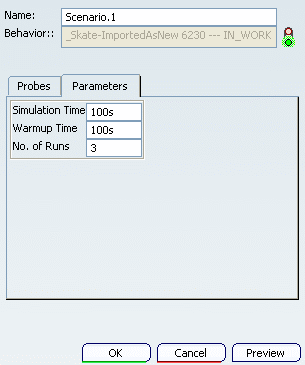
![]()





 .
.
 to get
to get 
 to add a scenario in the
to add a scenario in the 
 to remove a scenario in the
to remove a scenario in the 
 to get
to get 
 and select a system to edit scenario inputs.
and select a system to edit scenario inputs.
 launch the simulation toolbar to
execute and control the system simulation.
launch the simulation toolbar to
execute and control the system simulation. to view the saved/generated simulation results.
to view the saved/generated simulation results.